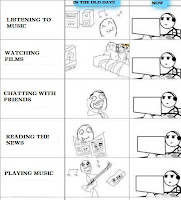SOCIAL MEDIA AND COMMUNITIES OF PRACTICE
Today we looked at Social Media and how it has developed and changed during the 21st Century. We considered how some of the technology we use now has evolved and how this impacts on the way we work,socialise and communicate with each other.
I feel that the social world is becoming smaller and smaller. Yet paradoxically, advances in technology are connecting people together in an isolating way.In this respect the next generation seems to be leading the way.
Both socially and psychologically, the 'digital generation' is seen to operate in quite different ways from the generations that preceeded it.
(Buckingham,2008,p.75.)
Technology like iphones, tablets and kindles are impinging on how we spend quality time together. Is texting replacing talking? Is facebook replacing face to face? It is clear that - as with social change - technology is also changing how the next generation is being educated.
Having digital technology at their fingertips all the time means that students think, work, and play differently from previous generations.
(Solomon and Schrum, 2007.p.27)
According to one 2009 study, an average of 2,272 text messages a month are currently sent or received via a US teen's phone screen; a 2010 report found that text massaging and social networking accounts for 64 percent of all cellphone use amoung 16-24 year olds in the UK.
(Watson,2010, p.11.)
When considering how people interact in today's technological society it is appropriate to analyse what Etienne Wenger describes as 'Communities of Practice.'
Communities of practice are groups of people who share a concern, a set of problems, or a passion about a topic, and who deepen their knowledge and expertise in this area by interacting on an ongoing basis.
(Wenger et al cited Donelan,2010,p.176.)
Wenger states that there are three main characteristics to a community of practice -
The Domain - People working together have a shared domain of interests. The group is able to value and learn from each others collaborative expertise.
The Community - The group work collaboratively and share information with each other that is in the best interests of the domain.
The Practice - the physical act of undertaking a 'shared interest' task. Important becauce the community members are brought together in a kalidescope of expertise.
(Johnson and Johnson. 1999.no page)
Meredith Belbin's Theory about Team Roles states that we all have a particular role that we play in each group. The effectiveness of the group depends on how the differing partise skills are merged collaboratively for the good of the shared interest.
I believe that throughout my employment history and also in University I tend to take the 'shaper' role in any group activity. Although I have a strong voice in a group I am also interested in supporting other members to push their expertise forward and mould the groups objective around our collaborative expertise.
As trainee teachers the classroom environment provides many challenges relating to group dynamics,communication and the role of each pupil. Social media is having a major impact on this.
It is my view that the way people communicate has changed forever. I agree with Wenger's definition of how a group of people work together for a common goal but if you were to ask 'How' this is achieved 20 years ago compared to now the answers would be completely different. In my lifetime e-mail is replacing letters; text is replacing phonecall; conference calls are replacing meetings.
I have grown up living in the 'Digital Immigrants' camp, although I am in the process of morphing into a 'Digital Native'. As I develop my understanding of new technology and how it can enhance classroom teaching and learning I can't help but remennise about a simpler time. This elective is my chance to catch up with today's technological society.
Referencing
Buckingham,D. (2008). Beyond Technology:Children's learning in the age of digital culture. Cambridge:Polity Press.
Donelan,H.,Kear,K.and Ramage,M.(2010). Online Communication and Collaboration. Oxon:Routledge.
Johnson,D.Johnson,R.(1999) Learning Together and Alone. Massachusetts:Viacom Company.
Solomon,G. Schrum,L.(2007)Web 2.0 new tools,new schools. 1st Edition. Washington:International Society for technology in Education (ISTE).
Watson,R.(2010). Future Minds:How the digital age is changing our minds,why his matters and what we can do about it. UK: Nicholas Brealey Publishing.


This is a very good first post. I am very impressed. You have taken the key points from the inputs, read further, reflected upon your own experiences and created an informative post.
ReplyDelete